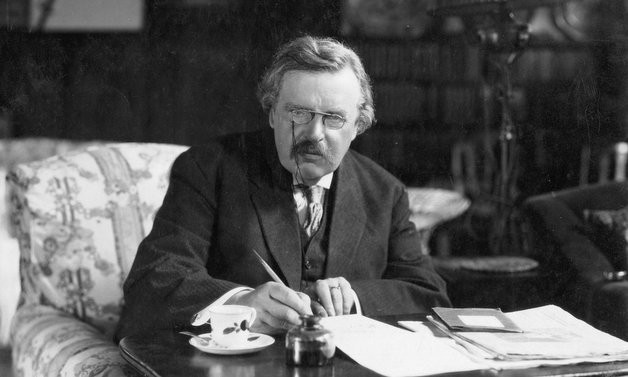Today marks the 139th anniversary of the birth of G.K. Chesterton. To any typical person, even a Chesterton fan, this factoid would be fairly unremarkable. Instead of being shouted from the rooftops, it would instead rest deep within the bowels of a Wikipedia article. That is, in fact, where I found it.
Clearly, the writers of Wikipedia are not typical people. Neither, for that matter, was George Bernard Shaw, who was among Chesterton’s dearest friends while also being reputed his strongest adversary in debate. It might seem surprising that he would not have thought Chesterton’s 139th birthday to be worthy of note, but even more remarkable is his reasoning why. In declining to write on a certain anniversary of William Shakespeare, he argued: “I no longer celebrate my own birthday, and I do not see why I should celebrate his.”
It seems that Shaw’s objection to celebrating comes not from selfishness, but fairness. These dates are unremarkable in his case, why should they be remarkable for anyone else? Is common sense correct in proclaiming these milestones on cards and cakes, or would it be better to relegate such arbitrary points of time to an obscure corner of the internet? Perhaps even let them pass by totally unnoticed, and consign them to oblivion. Why remark on the unremarkable—no serious journalist regards it as newsworthy when a boy turns 8. Why should we?
Chesterton, a journalist himself, turns this argument on its head. Since daily occurrences are not regarded as newsworthy, and only the extraordinary merits mention, a reader would not know a particular man was alive until he died. The obituaries are his first and only introduction into the press. This is the logical conclusion of weighing the strange as more significant than the ordinary.
What has any of this to do with Shakespeare and birthdays? Chesterton, in his article “Birthdays and Mr. Shaw”, answers his friend with a rather sweeping conclusion: “Now I understand why he does not appreciate Shakespeare. It is because he does not appreciate birthdays.” Shaw’s ‘birthday defense’ mentioned above was not his whole argument; he also refused to write about Shakespeare because he had a low opinion of his writing. Rather than seeing these two arguments as distinct, Chesterton sees a deep connection between Shaw’s aesthetic tastes and his views on the simple moments that mark the ordinary course of events:
Shakespeare was very plausibly presented by Shaw as a mere sullen sentimentalist, weeping over his own weakness and hanging the world with black in anticipation of his own funeral. It was all very ingenious, and you can quote a great deal in support of it. But, all the same, I am pretty sure that Shakespeare celebrated his birthday — and celebrated it with the utmost regularity. That is to say, I am sure there was strict punctuality about the time when the festival should begin, though there may, perhaps, have been some degree of vagueness or irregularity about the time when it should end.
This disdain for the ordinary forces Shaw to “reinvent the wheel,” since he has deprived himself of common sense:
There are some modern optimists who announce that the universe is magnificent or that life is worth living, as if they had just discovered some ingenious and unexpected circumstance which the world had never heard of before. But, if people had not regarded this human life of ours as wonderful and worthy, they would never have celebrated their birthdays at all.
There is, in the common human experience, the principle that every human being has worth. Even if a man does not realize it, his actions betray that reality:
If you give Mr. Jones a box of cigars on his birthday the act cannot be consistent with the statement that you wish he had never been born. If you give Mr. Smith a dozen of sherry it cannot mean in theory that you wish him dead, whatever effects it may have in practice. Birthdays are a glorification of the idea of life, and it exactly hits the weak point in the Shaw type of optimism… Mr. Shaw is ready to praise the Life-force, but he is not willing to keep his birthday, which would be the best of all ways to praise it.
Our natural disposition to recognize the good in others hints at the need for a supernatural end. With recognizing the good that a man currently possesses comes the wish that he attain even greater benefits. Birthdays thus look primarily forward, not backward: “A birthday does not come merely to remind a man that he has been born. It comes that he may be born again. And if a man is born again he must be as clumsy and comic as a baby.” Chesterton did not attain this understanding on his own. For we have been set on our baby steps by Christ, who admonishes us: “Amen, I say to you, whoever does not accept the Kingdom of God like a child will not enter it” (Mk 10:15).
Happy Birthday, G.K. Chesterton!







